

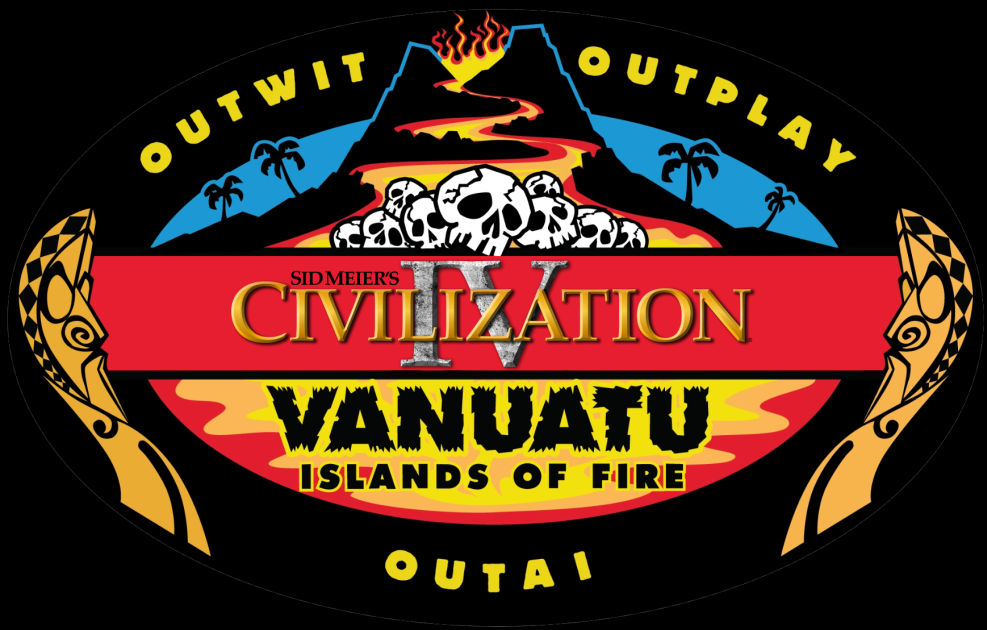
This summary for Game One was written by Eauxps I. Fourgott. Many thanks for volunteering to put this report together! 
The opening match of Season 7 was an interesting collection of leaders, on a map where none of them appeared to have a major edge. The two seeded leaders for this game were virtually opposites, the heavily aggressive Season 3 champion Stalin versus the ultra-pacifistic culture king Gandhi. They happened to start next to each other on this particular map, and either one was a likely winner depending on Stalin's actions: either he would roll through Gandhi en route to dominance, or he'd use his central position to go after other civs, leaving Gandhi to culture in peace with a friendly Pericles his only other neighbor. Most notable among the unseeded leaders was the highly aggressive Shaka in the other central starting position. With two warmongers bordering everybody else, this would not be a very peaceful game. As for the other corners, Isabella started next to Stalin and would be a significant wildcard based on where her religion spread, while Hammurabi and Pericles on the south of the map were likely to look to sit back and build in peace.

The initial expansion phase didn't offer anything too crazy up this time. Most of the leaders remained relatively even with each other and nobody got an amazingly large or small share of land. Additionally, there were no early wars in this game, so even those mistakes that were made (like Izzy failing to connect metals for a rather long time) were not punished, and their perpetrators given the time to recover. Gandhi and Isabella founded the first two religions as expected, and successfully converted their southern neighbors to each gain a loyal ally. More unusual was when Izzy founded a minority Taoism from Monotheism; this proved quite significant as the new Holy City was on a river that flowed through both Russia and Zululand, resulting in both civs converting to the third religion. This would help ensure that they ignored each other and focused on the civs on either side of them, while also meaning they would be equal-opportunity attackers who didn't favor either side.
Looking a bit more closely at each individual leader, Pericles executed a slightly-below-average landgrab and had mostly benefited from a gold resource at his capital that he could immediately hook up for early research. Hammurabi had had a slow start, resulting in him being one of the early trailers, but a late push put him up to a solid city count. Stalin also had a slow start and ceded basically all of the land east of him to Gandhi. He made matters worse by delaying Pottery and Mysticism for a long time, delaying the building of cottages or the expansion of his borders, and that resulted in him being one of the lower leaders on the scoreboard early on. Still, a couple of late captures of barb cities brought him up to a decent size, and he was far from out of it at the conclusion of the landgrab.

Gandhi himself had a solid start, grabbing most of the land in Stalin's direction, including a highly desirable gold resource about midway between the two, and placing most of his border cities on hills for better defense. He ended this phase with a decent core, but still nothing spectacular. On the other side, Izzy had a slow initial landgrab, but filled out her empire with several fishing villages later on, and her twin Holy Cities helped her to an early score and research lead. Shaka had perhaps the most interesting landgrab; he built settlers like mad and expanded faster than anybody else, only to completely crash his economy in the process, enough so that at one point, he was only researching at 2 beakers per turn, and without Pottery tech to improve his situation! Yet he was able to recover from this, perhaps thanks to his unique building Ikhandas, and while he had one of the weakest economies at this phase's end, he was still competitive and had one of the best city counts to boot.
Overall, this was still a very even match at the end of the landgrab phase. A couple leaders might be slightly ahead or behind, but there were no clear leaders or losers at the time the game's first wars began. To nobody's surprise, it was Shaka who kicked off the fighting, attacking Pericles on turn 93. This proved to be a pointless conflict, as catapults still weren't on the scene and neither leader had overwhelming force. Both leaders quickly realized this and signed an early peace. Pericles turned and breathed a sigh of relief, happy to get back to peacefully building... but what was this?
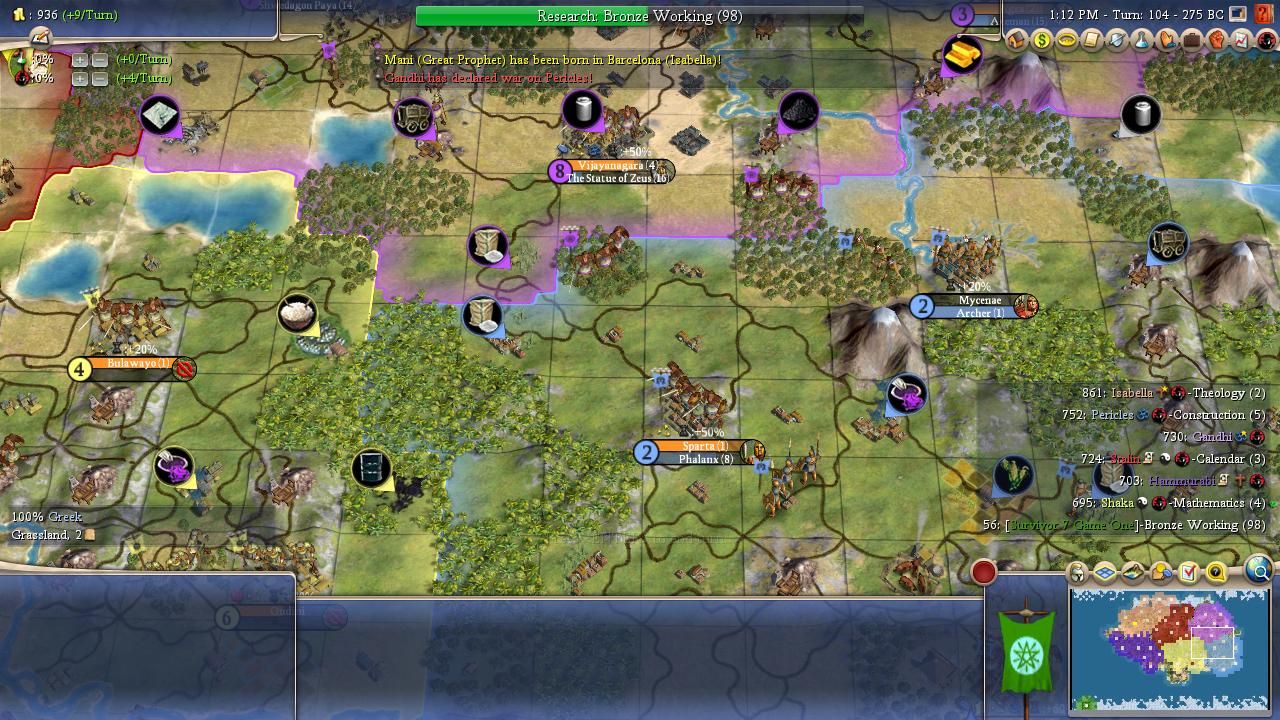
Gandhi?!? Attacking Pericles?!?  The uber-pacifist, attacking his high peace weight shield who shared his religion? Sullla's reaction said it all. This would eventually prove to be extremely impactful, one of the game's defining moments. It also made zero strategic sense for Gandhi, as he had no hope of cracking the Greek cities without catapults and was turning his only friend on the map against him to no gain. Pericles predictably cleared up his attack stack, but could make no progress of his own despite teching catapults, as Gandhi researched an early Feudalism and stuck longbows in all those hill cities. The war quickly settled into a stalemate, dragging down two leaders who by all rights should have been peacefully building instead.
The uber-pacifist, attacking his high peace weight shield who shared his religion? Sullla's reaction said it all. This would eventually prove to be extremely impactful, one of the game's defining moments. It also made zero strategic sense for Gandhi, as he had no hope of cracking the Greek cities without catapults and was turning his only friend on the map against him to no gain. Pericles predictably cleared up his attack stack, but could make no progress of his own despite teching catapults, as Gandhi researched an early Feudalism and stuck longbows in all those hill cities. The war quickly settled into a stalemate, dragging down two leaders who by all rights should have been peacefully building instead.
This also presented a golden opportunity for Stalin or Shaka to pile in for an easy conquest... but both leaders declined this chance. Having already failed with an attack to the east, Shaka turned west instead, declaring war on Hammurabi, while Stalin obeyed the call of border tension, ignoring Gandhi's more distant cities and attacking Isabella instead. Both of these wars quickly devolved into stalemates as well; all conflicts had started just before the advent of catapults, ruining the advantage of surprise as the leaders just suicided their starting stacks instead, and once that was done, nobody could get a decisive edge. Shaka had made a single conquest to gain the distinction of first blood, killing a pathetic one-chariot garrison to capture the city of Opis for the first of what would become many times. But that was it, and for decades afterwards, all six leaders remained locked in mutually destructive wars, stymieing their economies and bringing the global tech pace to a crawl with nothing to show for it. It was a massive stalemate the likes of which we almost never see in this competition.
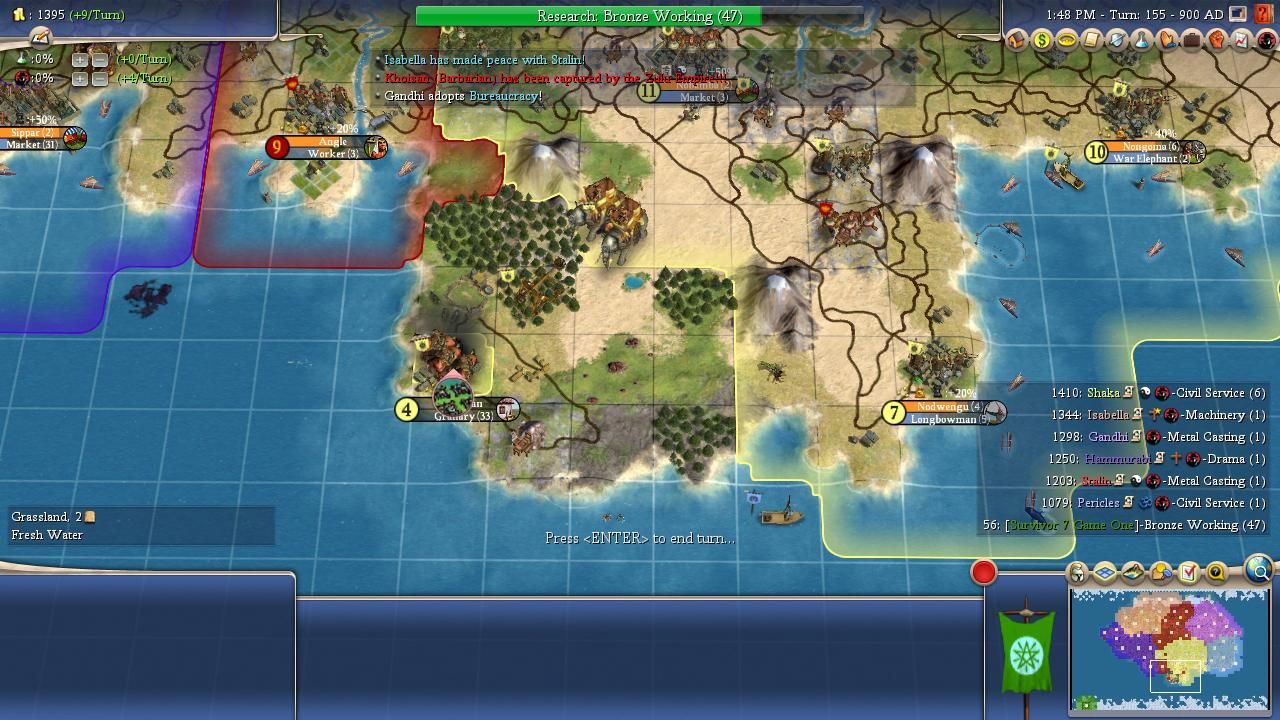
Eventually, after about 50 turns in this state, everybody had had enough, and a trio of peace treaties was signed. All anybody had gained from this fighting was one Russian city ceded to Isabella in the treaty, and the city of Opis which Hammurabi had recaptured, only to cede it right back in the peace treaty despite it being in no danger whatsoever.  That marked three times the city had changed hands already, for the record. Other than those very minor gains, all anybody had accomplished was stagnation. The real winner of this whole exchange was thus Gandhi, whose early longbows had afforded him the safety to start pushing ahead in culture while fighting with no losses. Other leaders had built the ancient wonders, but from the Classical era on it was Gandhi cleaning them up, starting to feed the cultural machine, and by the end of the wars he clearly had the best research rate and a modest lead on the tech tree.
That marked three times the city had changed hands already, for the record. Other than those very minor gains, all anybody had accomplished was stagnation. The real winner of this whole exchange was thus Gandhi, whose early longbows had afforded him the safety to start pushing ahead in culture while fighting with no losses. Other leaders had built the ancient wonders, but from the Classical era on it was Gandhi cleaning them up, starting to feed the cultural machine, and by the end of the wars he clearly had the best research rate and a modest lead on the tech tree.
In the broader picture, this remained an incredibly close matchup, with less than 300 points separating first place from last. Everybody still had a potential path to victory, and nobody was close to death yet. Shaka ended these conflicts with a narrow score lead and the biggest production base, but his economy was still terrible and needed some serious work. Izzy was still close to the top of the scoreboard and one city stronger, but hadn't managed to find a definitive advantage yet. Stalin had been set back, but continued to be near the top of the power graphs, which combined with his central position to make him still a very dangerous customer indeed. Hammurabi wasn't out of contention, but was minus one city with no real advantage over anybody else at this point in time. Finally, Pericles had been consistently at the bottom of the scoreboard throughout the great stalemate, the constant invasions blocking him from properly developing his civ. He hadn't actually lost anything to this point, but he desperately needed a chance to catch his breath, finally get up some important infrastructure, and in general do anything besides fight some more.
So of course, Shaka decided to make him fight some more, declaring war exactly two turns after he'd finally secured peace with Gandhi. The man simply could not stay at peace, and was determined to bash to his left and right until something finally gave. At first this seemed like a poor choice from a gassed leader, as Pericles quickly counterattacked to take a Zulu city... but it turned out that Shaka had just needed to move his big stack over from west Zululand where they'd been capturing the map's final barb city. Once they arrived, they easily retook the city, then moved forward, quickly sieged down the border city of Knossos, and captured it as well! Pericles was finally giving out, exhausted from ages of ceaseless warring. Gandhi had fatally weakened his best ally. Up north, after a short break, Stalin decided to go back at it again, once again ignoring Gandhi to attack Izzy and try to relieve her cultural pressure on his cities. While he quickly recaptured his ceded city, he then found himself "stalin" on the offensive once again. Then suddenly, his hopes came crashing down:
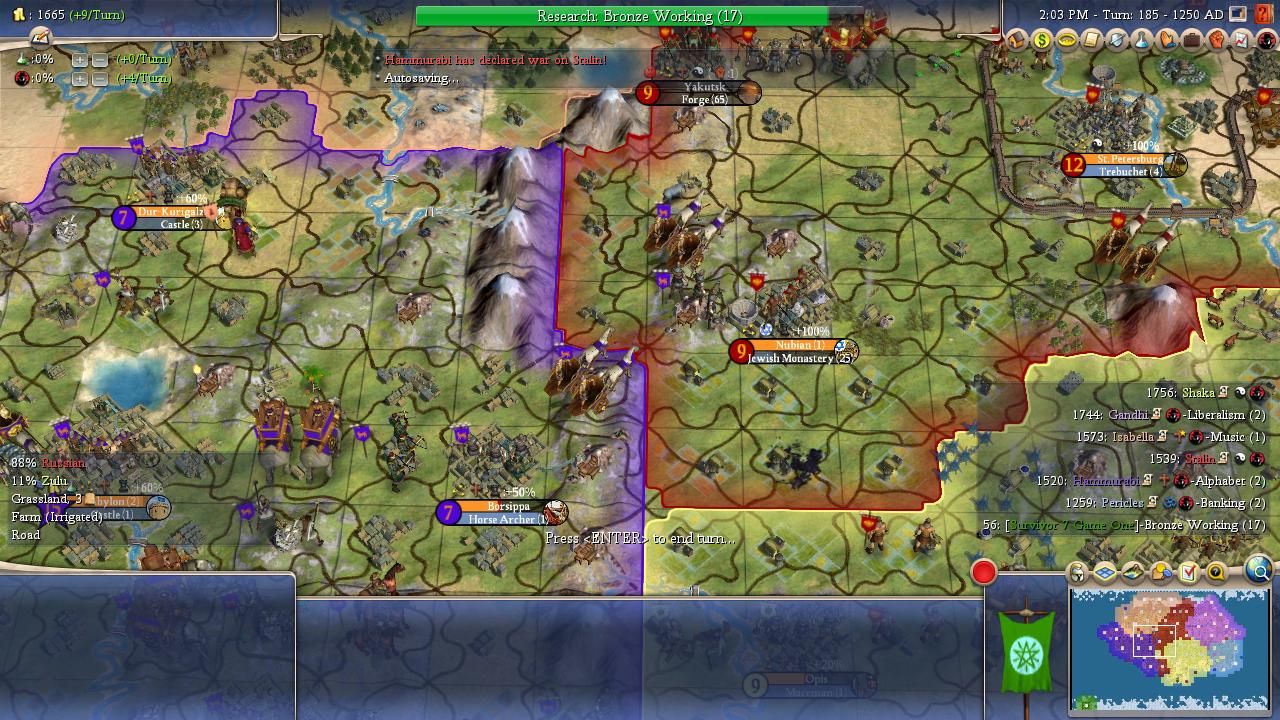
After ages of 1v1 wars with no dogpiles to break the stalemates, Hammurabi was the first to take advantage of the opportunity and turn one into a two-front war. Stalin quickly counterattacked, sending a stack into Babylonian territory, only to quickly see it get wiped out and Hammurabi's armies advance into his core. This was clearly a major turning point in the game, breaking the stalemate in the western bloc's favor. Down in the southeast, Shaka's next siege on Pericles' capital of Athens proved successful, taking the city in a decisive victory. The rout was now on, we finally had two losers, and it was a race to see which one would die first. At first Pericles had the edge, as even though only one leader was attacking him, Shaka was far more efficient than either Izzy or Hammur. But then Shaka made a bizarre move, signing peace with Pericles and getting his entire big stack stuck in Athens, surrounded by Greek culture. He declared war again thirteen turns later and picked up where he had left off, but that delay proved long enough to make the difference. Nobody was coming to Stalin's aid, and Gandhi even joined the dogpile at the end, although he failed to commit enough forces to actually take anything for himself. Instead, it was Izzy who struck the killing blow.
Thus, for the third season in a row, the opener's Pool One leader was the first to die. This was not a good performance from the former champion and picking contest favorite. Stalin had a weak start, delaying important economic techs for longer than he should have and keeping himself from assuming a truly strong position. Then his fatal flaw was striking out as a lone wolf and failing to work with others. Had he piled in for a 2v1 war against Gandhi or even Shaka, he would have been in great position to take some land and become a frontrunner, and Gandhi in particular gave him a golden opportunity in this regard. Instead, he went after Isabella alone, and while this made sense given their heavy border tension, he wasn't able to make any significant headway against her, and once another foe went after him and his dangerous central position, it was all over. He'll undoubtedly see more success in the alternate histories, but in the real thing it's an early exit for him for the third season in a row.
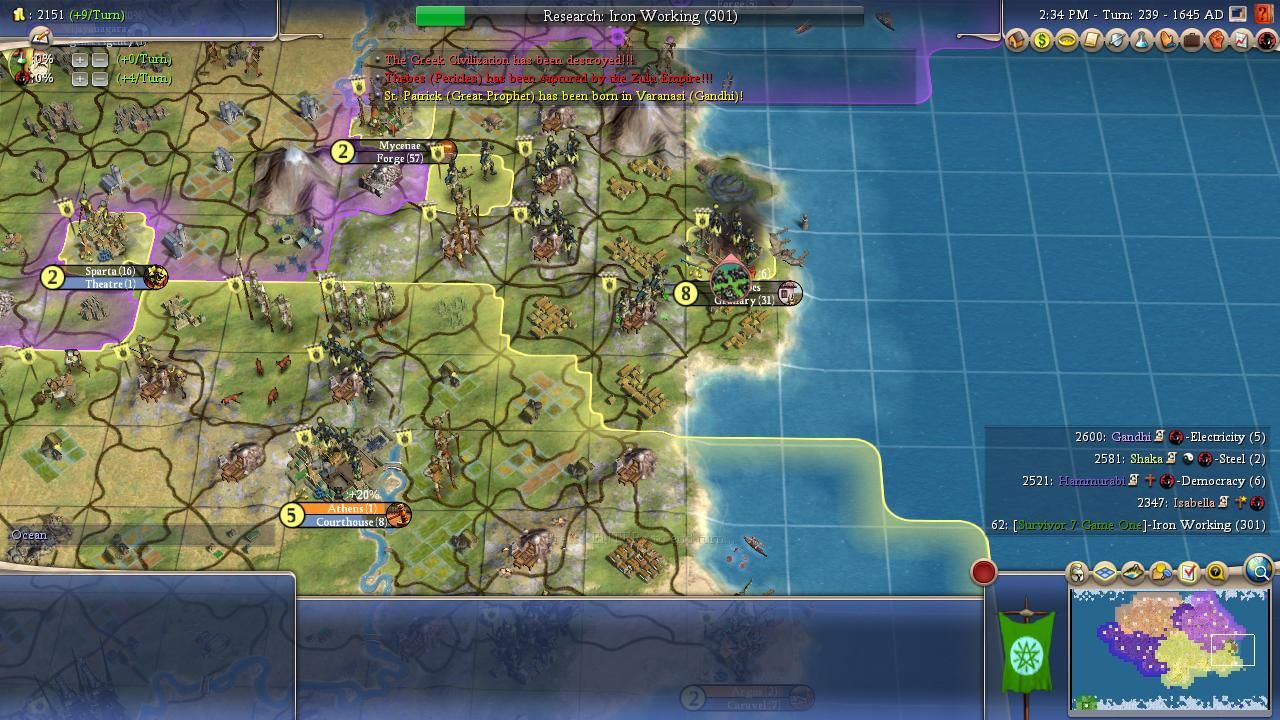
Pericles followed soon afterwards. The Greek leader hadn't done much wrong this game; instead he'd just suffered from constant aggression, including from a Gandhi that by all means should have been his best friend. And with Shaka attacking pre-Construction, and Gandhi teching an early Feudalism, Pericles didn't even have any opportunity to gain ground against them, instead getting worn down by stalemates and never having the chance to properly build up his civ. It is true that he ultimately failed against a similarly constantly-at-war Shaka despite owning superior military tech, indicating that his military building and fighting was not as good as it could have been, but on the whole it's hard to fault him for his poor performance in this game.
In the aftermath of the first two eliminations, Gandhi was clearly in the pole position. He had spent this period essentially at peace while everybody else fought, and while that did make him the only leader not taking more land, he had used the time well and built up by far the best economy in the game, gaining a significant tech lead and pretty much every first-to bonus as a result. He had also set up an effective cultural machine in his core, and was already only 100 turns away from a Cultural victory even without the slider. As for the others, it was a very tight contest for second place. Izzy and Hammur had taken virtually equal shares of Russian land, but Hammurabi had taken slightly more and was slightly ahead in score and economy. Shaka had the worst economy of the group but the most land and soldiers, and he was determined to press this advantage: The madman waited all of one turn after eliminating Pericles before turning north and attacking Gandhi. And this was honestly the best timing: Gandhi was out in front in tech, but he had predictably prioritized economic techs over the next-generation military ones such as Rifling, and so it was Shaka with the slight tech edge, having used some deep military beelines to bring grenadiers and cannons to the field to go with his vastly superior numbers. He marched up to the city of Vijayanagara, leveled its defenses almost instantly, and took it in very convincing fashion.
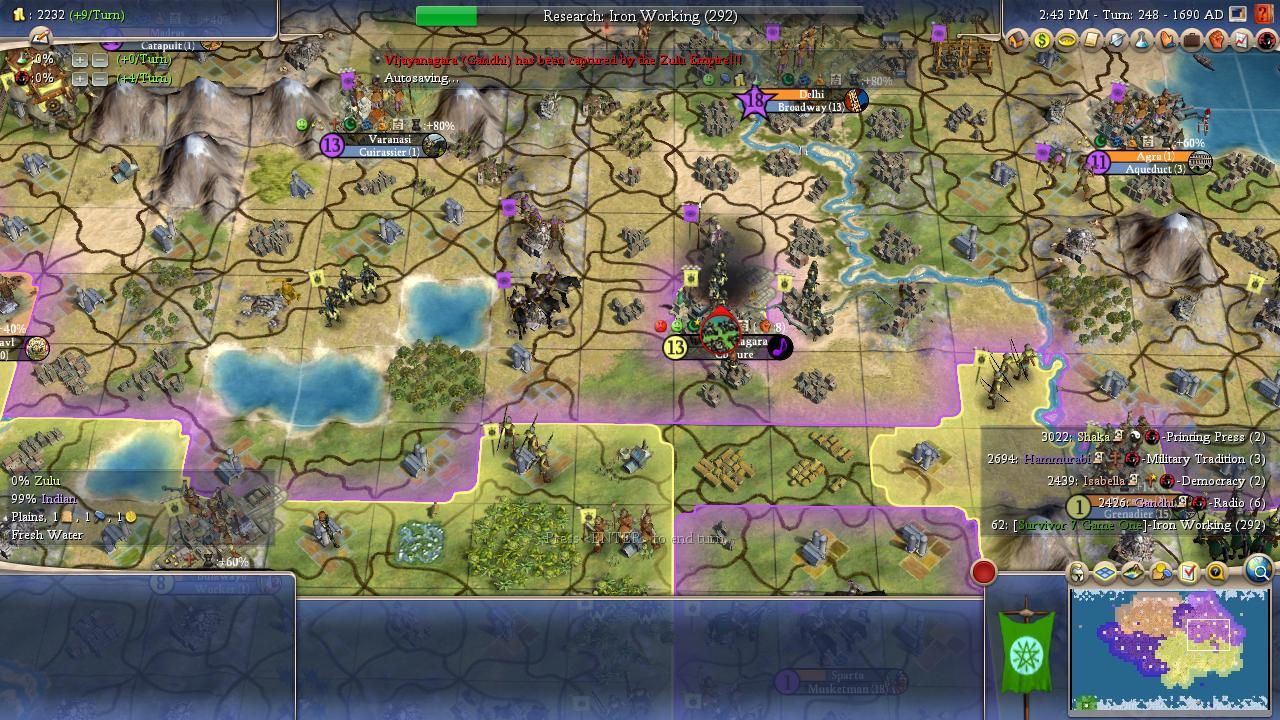
And Vijayanagara was one of Gandhi's three culture cities!!! 


In one fell swoop, Shaka had knocked Gandhi from the top of the pack and the likely winner to the bottom of the pack with no shot of victory anytime soon. This was a major turning point in the game: Gandhi had no fourth cultural city, and even if he somehow got Vijay back, it had lost all its cultural buildings and been set back significantly in its quest for Legendary status. Now the full impact of Gandhi's war declaration on Pericles became apparent; by keeping his ally weak and vulnerable to conquest by Shaka, Gandhi had tanked his own position as well, stopping Pericles from buying him enough time and allowing the Zulu to attack him while he was still vulnerable. Gandhi had idiotically destroyed his own game in a move completely out of alignment with his normal personality, a massive outlier result if ever there was one - and it was now making this game very interesting.
It was soon to get even more interesting. Hammurabi and Isabella did not sit idly by, and both separately planned and declared war on Shaka in short order, bringing him into a 3v1 war with every other leader on the map. As he so often does, Shaka had bitten off more than he could chew. Except... he wasn't folding?!? Hammurabi quickly took Opis for that city's fourth change of hands, but then his 70-strong stack just stopped and sat in place, not moving forward any further. In the east, Shaka continued pressing forward, capturing Gandhi's capital of Delhi to further put a lid on his cultural attempt. In the north, Isabella had made a critical mistake: she still hadn't researched any post-medieval military tech! Her elephants and maces didn't hold up so well against the Zulu grenadiers and cannons, and Shaka quickly cleared up her attack to go on the offensive in Spain as well. Things went from bad to worse for Izzy as Hammurabi saw the writing on the wall, handing over Opis for the fifth time to get a peace treaty, seemingly content to sit back in a safe second-place position. Against the odds, Shaka had survived the 3v1 against three more advanced opponents, and was still on the offensive.
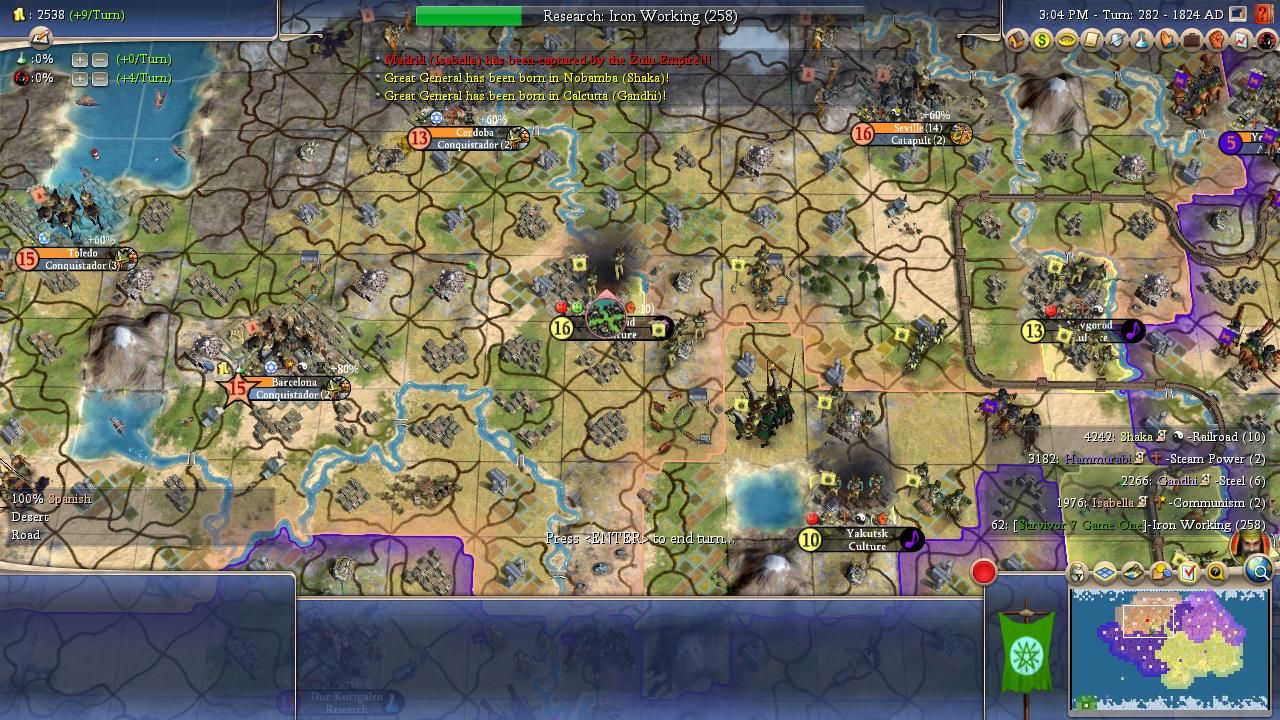
Shaka's tech tree was ridiculous. He had no Renaissance-era economic techs, but had made deep beelines to choices such as Steel and Rifling, keeping up to date on military, and that, his instinct to attack, and poor military building by his opponents was getting the job done. His offensive did stall out in India after taking one more core city, as he moved his big stack over to attack Spain instead, but there they met no resistance from the backwards defenders, and were taking each city out 2-3 turns after arriving at its gates. Notably, Spain was almost shielded from Zulu aggression by Hammurabi's Russian conquests, but a small set of cities that Izzy had taken was proving her undoing, as in Zulu hands their culture formed a narrow, sometimes one-tile path through the border. Izzy's core cities quickly fell and she did not appear to be long for this world. But then she got a stay of execution: Hammurabi came back into the fray! Apparently the peace treaty had all been a ploy, a chance to build up again and come into war with a fresh military. This was the last major turning point in the game, halting Shaka's advance and preventing him from properly snowballing, keeping him down to earth and irreperably harming his momentum. Hammurabi successfully took and held a couple of border cities - including Opis, for its sixth time changing hands - then stalled out, unable to make further progress. But this was stalling out Shaka as well, and his economic disadvantage was finally beginning to make itself felt. Hammurabi and Gandhi both had cavs where Shaka did not, and soon after he teched Military Tradition, his two enemies picked up Assembly Line to bring infantry to the fight against him. With Shaka's armies completely diverted from India, Gandhi was able to rally and start retaking his cities, eventually regaining his entire core. Both cultural cities were set back far enough that a victory was still nowhere near, but Gandhi had recovered from death's door and was a player in this once more. Vijayanagara contained the Statue of Zeus, which caused major war weariness problems for Shaka as soon as Gandhi took it back, on top of hefty penalties he was now facing as a result of not running Emancipation. Battered by unhappiness, his economy in shambles, facing attacks from all sides, Shaka seemed to be finally running out of gas.
But then he got a reprieve once more, as both leaders were willing to sign peace! Hammurabi even included Opis in the deal, that city swapping hands for the seventh time. This was the break Shaka needed, but it also left Izzy a complete sitting duck. She still had no military better than muskets, while Shaka was running around with tons of rifles and cavs, and her remaining cities soon fell like dominoes. She got one more save, as Gandhi backstabbed Shaka (with his third war declaration of the game!), resulting in the Zulu army retreating from her final city, which had all of one mace and one pike remaining on defense. Shaka's army was gigantic enough that Gandhi couldn't make significant headway, but the Indian leader now had tanks in his army as well, and that was enough to stem the Zulu tide and make this another inconclusive conflict. Eventually they signed peace, Gandhi picking up a single former Greek city for his troubles, and the one musket Izzy had managed to produce in the interim was not enough to stop Shaka from finally knocking her out.
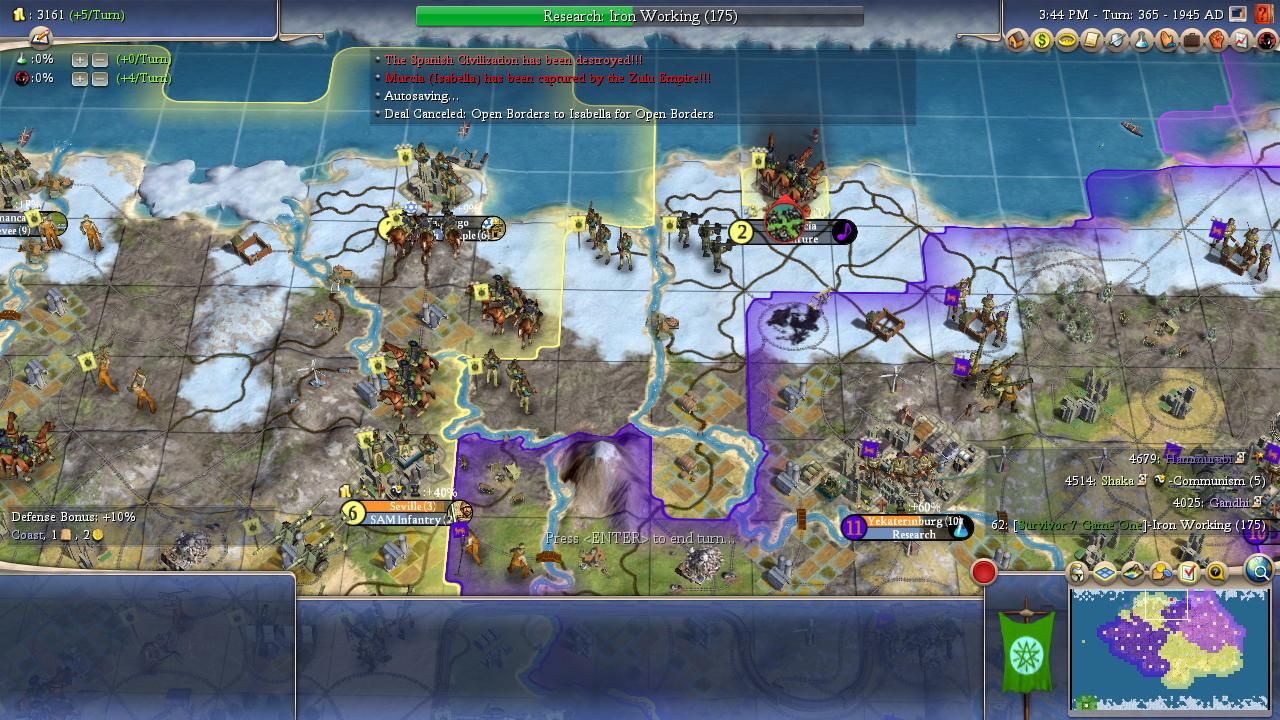
Isabella actually played pretty well for most of this game. She did a masterful job of leveraging her religious advantage, establishing a strong economy, becoming the score leader for most of the early period, and converting the more reliable of her two neighbors to make him a friend for life, and when Stalin came calling, she was able to hold her own and not let him get a foothold. Her diplomacy then came through in a big way when Hammurabi jumped in against Stalin for the game's first 2v1, putting her in a great position to move on to the playoffs, and she didn't just sit back and watch Shaka get out of control, jumping in to stop him instead. Unfortunately, somewhere along the way she forgot to develop her military and military tech, leaving her far behind in this regard when the big world war started, and that was a fatal mistake. A lack of commitment from her allies sealed her fate, and she will not be moving any farther in this competition.
Isabella was eliminated at Turn 365 - this had turned into one of the longest games in AI Survivor history, and we still weren't anywhere close to a victory! Hammurabi had the tech lead and at this point seemed likely to win by space, but he was still just in the early modern era. Shaka was in a strong second place in score, but now badly behind in tech and unlikely to stay at peace with his neighbors for the rest of the game. At this point it was likely a question of whether he'd hold out long enough to get a playoff spot, or finally get knocked down by one of his neighbors and send Gandhi along instead. A Gandhi victory still wasn't out of the question, either - at the moment he was on pace to lose to Hammurabi, but his cultural cities hadn't lost their accumulated culture, and if he turned on the culture slider, he could probably reach a Cultural victory before Hammur finished the spaceship.
And so the game finally picked up pace, as we had extended peace for the first time in ages. As the turns went on, Gandhi steadfastly refused to turn on the culture slider, seemingly content to let Hammurabi take the win instead. The last really important event of the game took place when Shaka, never content to just leave the status quo, declared war on Hammurabi yet again. This was an extremely short war, Gandhi stamping it out via the UN on the very next turn - but that one turn was one of the single most devastating turns of war ever seen. Hammurabi captured FOUR Zulu border cities, including Opis for the eighth and final time, and launched about twenty nukes into Zululand, hitting almost all of Shaka's core cities and irreparably devastating his lands:
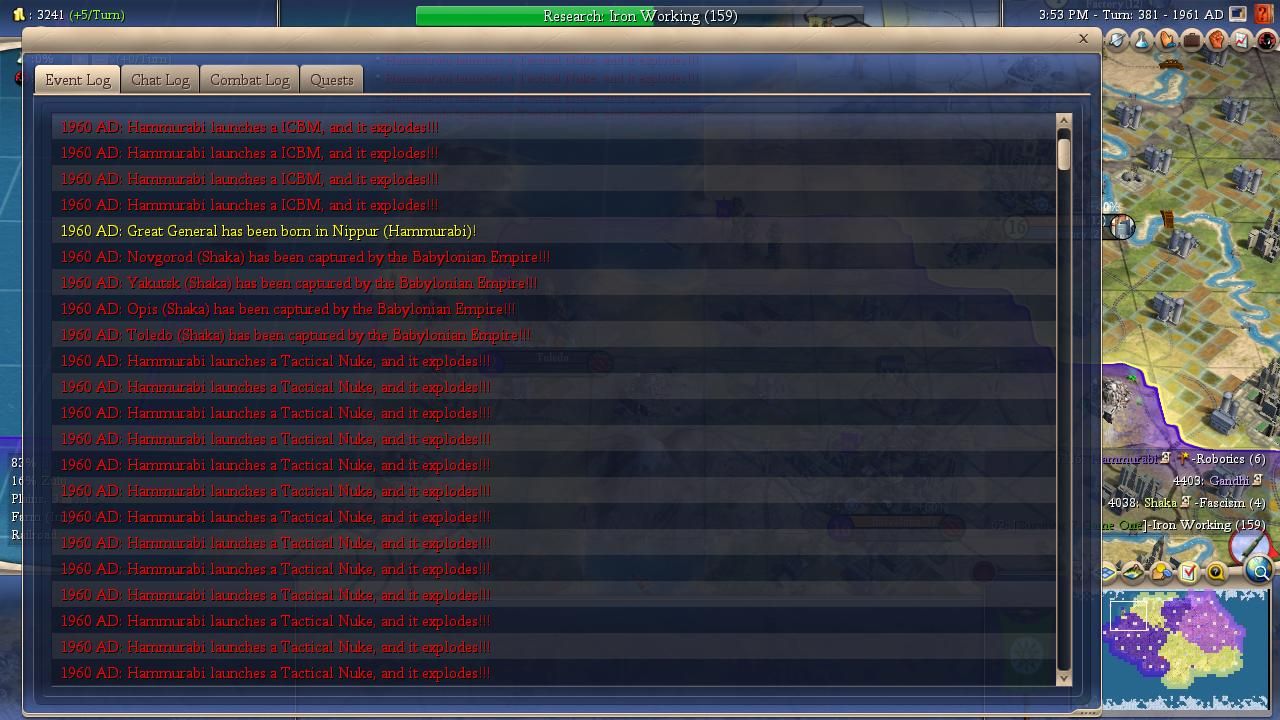
Shaka's territory was now coated in fallout, and the game would be over by the time he could research Ecology to get rid of it, leaving him with an empire full of useless tiles. In a single turn, he went from leading Gandhi by about 500 points to trailing him by about 400 points, and while he would recover some of that ground in the following turns, he couldn't completely make up the newfound gap, not without the ability to properly regrow his cities. Shaka had lost his playoff spot in one giant nuclear firestorm, and now our two advancing leaders were, at long last, determined.
Shaka would give us a few more fireworks before the end of the game, declaring one final war against Gandhi in the closing turns. He didn't fare any better here, and with no UN resolution to stop him, Gandhi slowly but surely started taking Zulu cities, sealing Shaka's fate if that hadn't been certain already. What Gandhi did not do was turn on the culture slider, and that made all the difference in this result. To get an idea of how far Shaka had set this game back, Gandhi's former third city of Varanasi had over 100,000 culture in it at the end of the game! But Vijayanagara was stuck at a very close, but not close enough, 45K culture when Hammurabi's spaceship finally arrived at Alpha Centauri and brought this crazy game to a close.
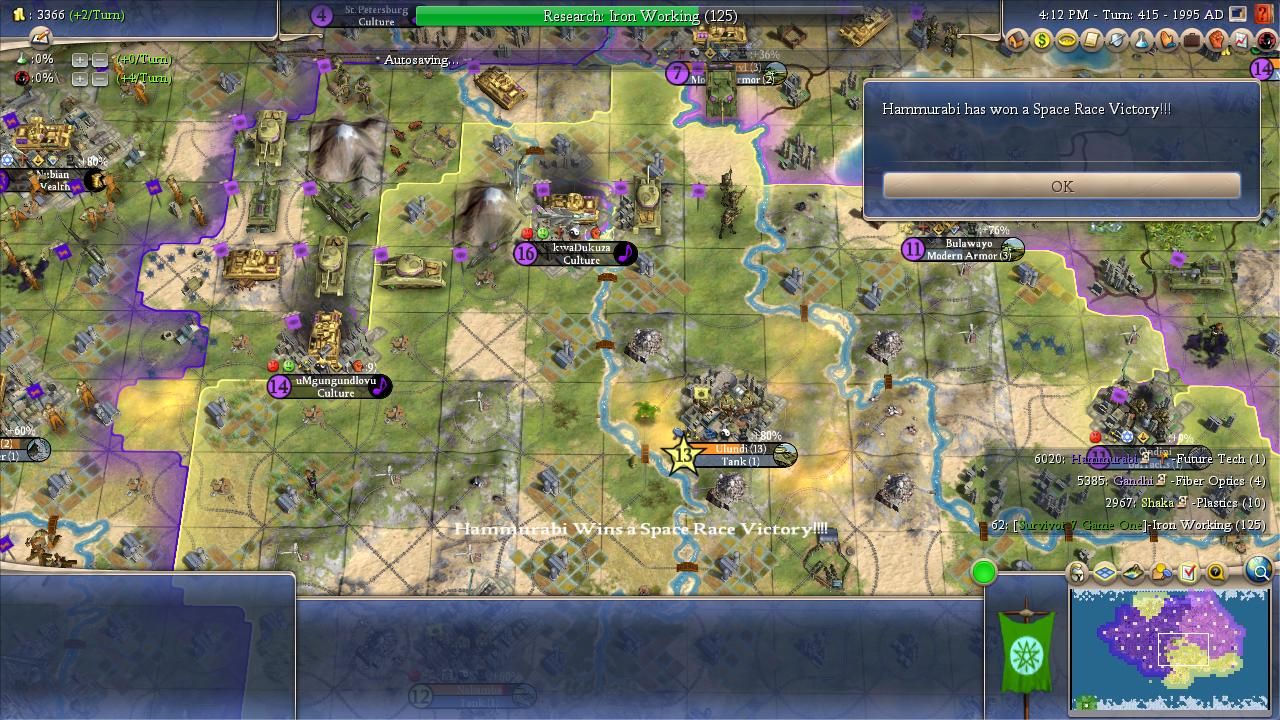
After seven seasons, Hammurabi finally secures his first game win in his AI Survivor career! Mind you, this was a spaceship win that did not come until Turn 415 - not the latest finish in this competition's history, but it is in the top five, and the fact that this is the only way Hammur's ever been able to win thus far indicates that he's not that strong of a leader. To his credit, he did play well and deserve the win in this particular match. While he had a bit of a slow start, he did successfully fend off an early Shaka invasion, make one of the game's best moves by dogpiling Stalin to become a true contender, and backstab Shaka at the right times later on to stop him from completely running away with the game, while keeping himself safe from the full brunt of Zulu retaliation. He made two of the four biggest moves of the game, the whole time running one of its better economies. But one also gets the feeling that most other leaders would have done significantly better at actually taking Zulu territory, or running that economy, and certainly wouldn't have repeatedly given back the same city to get out of wars they were winning. In any case, Hammurabi gets to rest on his laurels for now, and will be seeing his second playoff appearance in a couple of months. Meanwhile, Gandhi advances to the playoffs for the fifth time in seven seasons, but this was, uh... not a very good display from him. He got a dream scenario for much of the game, nobody attacking him until Shaka's late declaration and everybody letting him build in peace instead... and then he nonsensically backstabbed his best ally, not only slowing his own development, but also weakening Pericles enough that Shaka could later run over him, and subsequently start running over Gandhi to knock him out of the running! That's, uh, not the best way to capitalize. Even then, he could have still won the game with a concerted cultural effort, only to ignore that as well and settle for a second place that he only got due to Shaka committing suicide. Given the early events of this game, Gandhi should have won in a runaway, but he bungled it badly and only made it out alive thanks to timely interventions from the other side of the map. The result was an unusual second place finish from a leader who's typically all-or-nothing, but a playoff spot is a playoff spot, and that's what really matters in the end.
Lastly, Shaka survives to cause more trouble in the Wildcard game. This was an extremely on-brand game for him, as he attacked early and often, always built military, and never bothered to build a good economy, but with the wacky situation in this game, it actually ended up working out well for him. He was able to outlast Pericles long enough to get the edge and run over him, and after that handled a three-front war extremely ably. Ultimately the extended three-front fighting was more than he could handle, though, stalling him out long enough for his inferior economy to finally manifest itself in military tech, and he inevitably attacked one too many times, throwing away a playoff spot late in the game with a hopeless war against a far superior foe. Still, were it not for that last Hammurabi backstab, Shaka probably would have won this game, and all things considered it was quite an impressive performance - and certainly an entertaining one!

This turned out to be an extremely memorable game, characterized largely by constant warfare and a lot of unexpected results. The early stalemates gave this game a unique flavor, and even once those were finally broken, Shaka's adventures and near-success made for an exciting second half. All these twists and turns made for an interesting game indeed, and even though this is probably a high-variance map, I get the feeling that this particular outcome will turn out to be a very unlikely result that we got the privilege of having as the real thing. Season 7 certainly has started off with a bang; let's see if the momentum can continue as we continue the opening round! Thanks as always to all who make this tournament possible.



